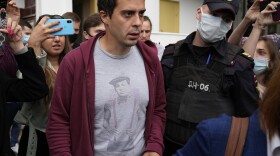
Lucian Kim
Lucian Kim is NPR's international correspondent based in Moscow. He has been reporting on Europe and the former Soviet Union for the past two decades.
Before joining NPR in 2016, Kim was based in Berlin, where he was a regular contributor to Slate and Reuters. As one of the first foreign correspondents in Crimea when Russian troops arrived, Kim covered the 2014 Ukraine conflict for news organizations such as BuzzFeed and Newsweek.
Kim first moved to Moscow in 2003, becoming the business editor and a columnist for the Moscow Times. He later covered energy giant Gazprom and the Russian government for Bloomberg News.
Kim started his career in 1996 after receiving a Fulbright grant for young journalists in Berlin. There he worked as a correspondent for the Christian Science Monitor and the Boston Globe, reporting from central Europe, the Balkans, Afghanistan, and North Korea.
He has twice been the alternate for the Council on Foreign Relations' Edward R. Murrow Fellowship.
Kim was born and raised in Charleston, Illinois. He earned a bachelor's degree in geography and foreign languages from Clark University, studied journalism at the University of California at Berkeley, and graduated with a master's degree in nationalism studies from Central European University in Budapest.
-
The dacha — a Russian summer home that can be anything from a shack to an oligarch's faux chateau — is both an escape from the city and a state of mind that permeates the country's life and culture.
-
The recently expanded law says that freelance journalists, YouTube bloggers and practically anyone else who receives money from abroad and voices a political opinion can be considered a foreign agent.
-
U.S. climate envoy John Kerry is in Moscow, making him the highest-ranking Biden administration official thus far to visit the Russian capital.
-
Russia's cyberwarfare activity was a focus of President Biden's meeting with President Vladimir Putin last month. Analysts say it is the great leveler when it comes to Russia-U.S. competition.
-
President Biden and Russian President Vladimir Putin held their much-anticipated summit in Geneva. They talked for about three hours. What are the outcomes of that meeting for both countries?
-
After weeks of planning, the summit between Russian President Vladimir Putin and U.S. President Joe Biden has ended. The two leaders' meeting lasted four hours.
-
Nearly a year after Belarusian leader Alexander Lukashenko's crackdown, "None of us doubt that we will prevail," an activist tells NPR. Others sound worried. "Every day is a little scarier," says one.
-
NPR's Mary Louise Kelly talks with NPR White House and Moscow correspondents Ayesha Rascoe and Lucian Kim about what to expect when Presidents Biden and Putin meet for the Geneva summit later in June.
-
There is international outrage over the actions of the regime in Belarus, which diverted an international passenger flight on Sunday in order to seize an opposition activist who was on board.
-
The authorities in Belarus forced a passenger flight to land in the capital of Minsk and then detained an opposition leader who was one of the passengers on board.
-
Russian officials report thousands of new COVID-19 cases and hundreds of deaths everyday, but that's not reflected on the streets of Moscow, where people act as if the pandemic is over.
-
Independent outlets that challenge the official line are coming under increasing pressure in Russia. But one Russian TV channel is taking Kremlin propaganda head on.



